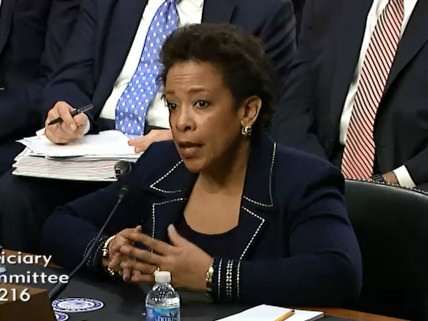Is Lying About Marijuana a Prerequisite for an Attorney General?
Loretta Lynch denies the obvious truth that pot is less dangerous than alcohol.

During her confirmation hearing yesterday, Loretta Lynch, President Obama's nominee to replace Eric Holder as attorney general, showed that she will happily lie to secure the job. Alternatively, she demonstrated her fitness for the job, which requires enforcing arbitrary distinctions among psychoactive substances, by displaying woeful ignorance about the relative hazards of marijuana and alcohol. I'm not sure which interpretation is more charitable.
Sen. Jeff Sessions (R-Ala.), an old-timey "Just Say No" prohibitionist, was "heartbroken" last year when Obama admitted, during an interview with The New Yorker, something that is obvious to anyone who considers the evidence: that alcohol, as measured by acute toxicity, impact on driving ability, frequency of addiction, and the long-term effects of heavy consumption, is more dangerous than marijuana. It was clear at yesterday's hearing that Sessions still has not recovered from that affront to his worldview, according to which alcohol is a benign social lubricant while marijuana is a devil weed with its roots in hell. He sought solace from Lynch, reading her the relevant part of the New Yorker interview and imploring her to disagree with the man who had nominated her to be the nation's top law enforcement official. Lynch, currently the U.S. attorney for the Eastern District of New York, obliged:
I certainly don't hold that view and don't agree with that view of marijuana. I certainly think the president was speaking from his personal experience, personal opinion, neither of which I am able to share.
You don't need to have smoked as much pot as the president did in his youth to recognize that its harms pale beside those associated with alcohol and tobacco. Even Patrick Kennedy, co-founder of the anti-pot group Project SAM, concedes that "alcohol is more dangerous." So does Michael Botticelli, Obama's drug czar, along with a large majority of Americans (including many who nevertheless do not think marijuana should be legal). Pace Lynch, this is not a matter of "personal opinion." It is a threshold test of intellectual honesty.
You can admit that marijuana is less dangerous than alcohol and still oppose legalization, as Kennedy and Botticelli do. But this truth is undeniably inconvenient for pot prohibitionists, since it casts doubt on the wisdom and fairness of the lines Congress has drawn. An honest prohibitionist sucks it up and presses his case anyway, saying it would be impractical to ban alcohol but reckless to allow unfettered access to another intoxicant, even one that is less dangerous. A dishonest prohibitionist does what Lynch did.


Show Comments (31)